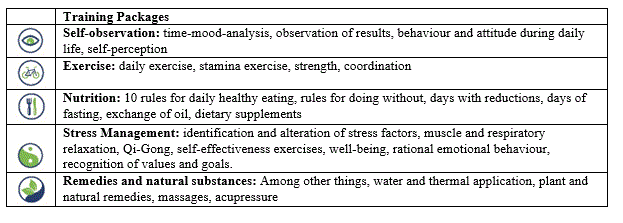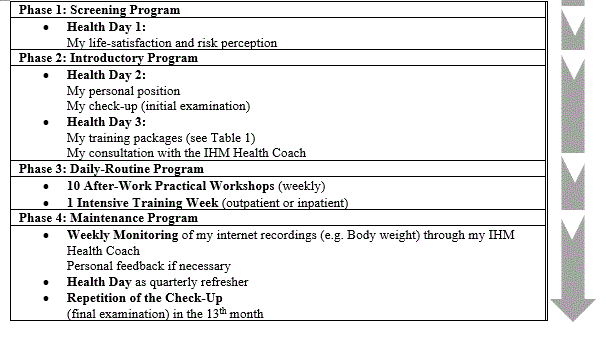According to naturopathic understanding, personal organismic and mental contributions of the human being in the sense of an “internal doctor” are necessary for the preservation and restoring of health and the avoidance of illness. This includes the proper responsibility for a health supporting behaviour in everyday life. The comprehensive lifestyle intervention program “Individual Health Management” (IHM), developed by Professor Dieter Melchart, MD of the Competence Centre for Complementary Medicine and Naturopathy (CoCoNat), Technical University Munich [1], combines a modern web based health portal named VITERIO® („Virtual Tool for Education, Reporting, Information and Outcome“ - www.viterio.de) with personal health support in the form of counselling, workshops, courses and treatment at health resorts (“Blended Learning Approach”). The objective of the program is health support, prevention of disease and training of patients suffering from cardiovascular disease, metabolic disease and the consequences of stress. For example, treatment of obesity requires intensive education, counselling and ongoing support. In our own studies we have applied successfully IHM in a randomized controlled trial on weight reduction [2].
Through the strengthening of health resources and the reduction of risk factors, IHM is considered to be appropriate in order to improve health and to retard, reverse or halt chronic diseases. The lifestyle-medical strategy of the program is adjusted according to the identification of individual risk and protective factors and the designation of therapeutic goals. The concept of IHM follows general guidelines for (self-) management in terms of “check – plan - act” and consists of a 12-week basic training program and a minimum of a nine month maintenance phase. By using modern methods of mediation and the personal support of a core team of doctors and IHM-Health-Coaches, each individual will become the manager of his or her own health.
IHM is orientated on the salutogenetic model [3] and theory of a health-illness continuum, and, is directed at both “healthy” and “ill” people with the goal of strengthening their self-determination, self-competence and own responsibility in both sickness and health.
Background theories are, among others, the systemic requirement and resource model, the balance and conflict model, the training of emotional competences according to M. Berking [4], the model of systematic self-observation and self-reflection of health behaviour according to G. Krampen [5] and also rational-emotive behavioural therapy [6].
The basic concept of IHM is “check – plan – act” and thereby the central element of IHM is a form of self-management, based on the participant’s ability to take care of and to optimise his or her so called physiological basic functions (exercise, nutrition, vegetative balance, resistance, thermal balance, sleep, rhythm) and psychosocial and cognitive basic competence (self-competence, social-competence) in everyday life, with the objective to sustainably increase, maintain or restore his or her personal quality of life and life satisfaction through a healthy lifestyle.
The principle of the program lies in the strengthening of the self-perception and self-reflection of maladaptive behaviour and inadequate emotional-cognitive assessments and their correction.
The timeframe of IHM encompasses a 12-week period of basic training followed by further nine months of maintenance training for optimisation and stabilisation. The program is sub-divided into Health Checks and a trimestral week of self-observation.
Central goal of the Health Check is to identify health related risk and protective factors with the assistance of web-based tools and aids. The participants learn to monitor their own behaviour and to record the results daily and symptoms during illness in VITERIO®. The e-health portal gives feedback in the form of reports, graphical elements and personal consultation.
Health check 1:
- Medical risk perception of the most important endemic diseases
- Determination of personal life-satisfaction as the most important positive factor
- Introduction to the definition of one’s personal position: How do I feel? To which extend am I satisfied with my life?
Health check 2:
- Continuation of the definition of one’s personal position: What worries me? Which are the consequences of my personal stress situation? Which protective factors do I have?
- Extended Health Check with systematic ascertainment of worldwide cardiovascular risks, stress factors, vegetative stress, addictive factors and physical and psychosocial protective factors with regard to exercise and nutritional behaviour, resistance, sleep, health competence and social competence
- Feedback in the form of a risk and protective factor report,
- Health Chart in traffic light colours in the e-health portal VITERIO®.
Health check 3:
- Medical-psychological check-up with the creation of electronic-health-history, vaccination health record, biographical health record, emergency data in the sense of the European data record (eHealth)
- Report and check-up results are available as hard copies and electronically
Health planning (“plan”)
Objective of health planning is the formulation of quarterly training goals. With the help of medical assistance the participant determines the areas in which lifestyle changes could be made. Support is given through weekly plans which are developed in assistance with Health Coaches. All participants get continuous help for decision making and the scheduling of medical check-ups for early recognition.
Health practice (“act”)
Web based trainings packages (nutrition, exercise, stress-management, self-observation remedies and natural substances) provided in the e-health portal VITERIO® help to put the IHM into practice and daily routine. Additionally, specific offers like personal coaching or “distance lifestyle counselling”, health days, forum-lectures, practical workshops performed as individual training or in groups (learning and experiencing of health supporting behavioural or attitudinal measures and self-help techniques) support the participant in practising a healthy lifestyle (Table 1).
Table 1. Training packages. The following training packages are tailored to the concept of the IHM and help to implement the basic concept

The various phases of the program can be put together as varying modules and program-proposals. Depending on the target groups, interests and the participant’s time-related possibilities, schedules can be adapted to fit both customers and patients. The gathering of personal basic data such as body weight, height, waist circumference and blood pressure and the measuring of daily exercise and moods, is carried out. For this reason the following schedules are examples only (Table 1).
Phase 1 – Screening-program
The fundamental contents of the Screening-Program (“Health Check 1”) are the determination of life-satisfaction, and a medically-preventive risk screening.
For “Health Check 1”, basic health data (height, weight, waist circumference and blood pressure) is collected followed by the subsequent completion of several questionnaires (e.g. life-satisfaction, quality of life). The participants are informed about the implementation and importance of the initial self-observation-week. Phase 1 is concluded with a health report providing feedback on the results of the questionnaires and possible risk factors. The report ends with a recommendation to whether the user should consult a doctor for further risk clarification. In accordance with the results, fundamental recommendations for lifestyle training are formulated on the last page of the health report.
Phase 2 - Introductory program
The next phase of the program is concerned with the continuation of the Health Check in the sense of a personal standpoint. This is supplemented by a medical check-up. A further health day introduces the participant to various training packages (Table 2).
Table 2. Program phases

In the foreground of the so called “Health Check 2” are the questions, “Which stress situations do I have in daily life?” “How should I react to stress?” “What are my protective factors for health and how do they help me to combat individual burdens?” The goal of the second health day is to deepen the knowledge on health with regard to existing relations between “requirements/stress situations” and “protective factors/resource factors”, which are illustrated and summarised in the individual health “traffic light” graphic.
Finally, the importance of performing a personal time-mood-analysis and the necessity of the second self-observation-week are explained.
2021 Copyright OAT. All rights reserv
A medical check-up is organised to take place during the second health day. The purpose of this is to define the indication and therapeutic goal together with the participant. Co-supervision carried out by a doctor is obligatory for certain risk-constellations and diseases.
Subsequent to the second self-observation week a third health day is organised, whereby the actual training is prepared in order to instruct the participants regarding various training packages and the tool “Info@zept” which is a short information brochure tailored to the needs of the participant.
Phase 3 - Daily-routine-program
The Daily-Routine-Program consists of 10 weekly outpatients “After Work” practical workshops of about 2.5 hours. The goal of this part of the program is the deepening of the training contents into the everyday life. An intensive week is planned for roughly the 7th Week, this will be carried out as either a modernised fasting week or as intensive stress training. For the need of different target groups (e.g. non-regional companies, medical tourism), phases of weekly presence or as long weekends can be organised.
Phase 4 - The maintenance program
Over a period of nine months the participant shall enter regularly distinct vital data (e.g. daily weight) into the e-health portal. With regard to completeness and quality, these entries will be controlled on a weekly base by IHM Health Coaches, who give feedback and comments if requested. Furthermore, the Health Check and self-observation-week will be repeated on a quarterly base and one or several specific health days will be carried out as refreshers. Thereby the contents of the IHM shall become a matter of routine enabling the participant to practice unassistedly a healthy lifestyle in daily life.
- Melchart D, Eustachi A, Wellenhofer-Li Y, Doerfler W, Bohnes E (2016) Individual Health Management - A Comprehensive Lifestyle Counselling Programme for Health Promotion, Disease Prevention and Patient Education. Forsch Komplementmed 23: 30-35.
- Melchart D, Low P, Wuhr E, Kehl V, Weidenhammer W (2017) Effects of a tailored lifestyle self-management intervention (TALENT) study on weight reduction: a randomized controlled trial. Diabetes Metab Syndr Obes 10: 235-245.
- Antonovsky A (1993) The sense of coherence as a determinant of health. In: Beattie A GM, Jones L, Sidell M editor. Health and wellbeing: a reader. Basingstoke: Macmillan/Open University, pp: 202-214.
- Berking M (2015) Training emotionaler Kompetenzen Springer.
- Krampen G (2008) Systematic Self-Monitoring and Reflection of Health Behavior in Widely Different Preventive Settings. Swiss Journal of Psychology 67: 205-218.
- Ellis A (2004) Rational Emotive Behavior Therapy: It Works for Me - It Can Work for You. Prometheus Books.
